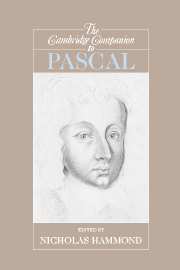Book contents
- Frontmatter
- Introduction
- 1 Pascal’s life and times
- 2 Pascal’s reading and the inheritance of Montaigne and Descartes
- 3 Pascal’s work on probability
- 4 Pascal and decision theory
- 5 Pascal’s physics
- 6 Pascal’s philosophy of science
- 7 Pascal’s theory of knowledge
- 8 Grace and religious belief in Pascal
- 9 Pascal and holy writ
- 10 Pascal’s Lettres provinciales
- 11 Pascal and the social world
- 12 Pascal and philosophical method
- 13 Pascal’s Pensées and the art of persuasion
- 14 The reception of Pascal’s Pensées in the seventeenth and eighteenth centuries
- Bibliography
- Index
3 - Pascal’s work on probability
Published online by Cambridge University Press: 28 May 2006
- Frontmatter
- Introduction
- 1 Pascal’s life and times
- 2 Pascal’s reading and the inheritance of Montaigne and Descartes
- 3 Pascal’s work on probability
- 4 Pascal and decision theory
- 5 Pascal’s physics
- 6 Pascal’s philosophy of science
- 7 Pascal’s theory of knowledge
- 8 Grace and religious belief in Pascal
- 9 Pascal and holy writ
- 10 Pascal’s Lettres provinciales
- 11 Pascal and the social world
- 12 Pascal and philosophical method
- 13 Pascal’s Pensées and the art of persuasion
- 14 The reception of Pascal’s Pensées in the seventeenth and eighteenth centuries
- Bibliography
- Index
Summary
Anceps fortuna aequitate rationis reprimitur
Before the time of Pascal there was no theory of probability, merely an understanding (itself incomplete) of how to compute 'chances' in gaming with dice and cards by counting equally probable outcomes. In addition, problems encountered in the enumeration of dice throws and the counting of arrangements and selections of things had led to an incipient mathematical theory of combinations and permutations, but the rules that appeared in the works of such authors as Tartaglia (1500-57) and Cardano (1501-76) still had the form of recipes rather than as parts of a coherent whole. It fell to Pascal to bring together the separate threads and weave them into a structure that enabled him to progress far beyond his predecessors by introducing entirely new mathematical techniques for the solution of problems that had hitherto resisted solution, techniques which became the foundation of the modern theory of probability.
Pascal’s influence was not direct, for none of his writings on probability were published during his lifetime, but instead was transmitted via Huygens to James Bernoulli, where it appeared in the latter’s influential Ars conjectandi of 1713, and via the Essay d’analyse sur les jeux de hazard of Montmort, first published in 1708. These two books, together with De Moivre’s The Doctrine of Chances (1718), firmly established probability theory as a branch of mathematics. Later scholarship has confirmed the view that Pascal may justly be regarded as the father of the theory of probability.
- Type
- Chapter
- Information
- The Cambridge Companion to Pascal , pp. 40 - 52Publisher: Cambridge University PressPrint publication year: 2003
- 2
- Cited by

